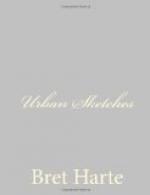With these slight drawbacks my suburban residence is charming. To the serious poet, and writer of elegiac verses, the aspect of Nature, viewed from my veranda, is suggestive. I myself have experienced moments when the “sad mechanic exercise” of verse would have been of infinite relief. The following stanzas, by a young friend who has been stopping with me for the benefit of his health, addressed to a duck that frequented a small pond in the vicinity of my mansion, may be worthy of perusal. I think I have met the idea conveyed in the first verse in some of Hood’s prose, but as my friend assures me that Hood was too conscientious to appropriate anything not his own, I conclude I am mistaken.
LINES TO A WATER-FOWL.
(Intra Muros.)
I.
Fowl, that sing’st in yonder pool, Where the summer winds blow cool, Are there hydropathic cures For the ills that man endures? Know’st thou Priessnitz? What? alack Hast no other word but “Quack?”
II.
Cleopatra’s barge might pale To the splendors of thy tail, Or the stately caravel Of some “high-pooped admiral.” Never yet left such a wake E’en the navigator Drake!
III.
Dux thou art, and leader, too, Heeding not what’s “falling due,” Knowing not of debt or dun,—Thou dost heed no bill but one; And, though scarce conceivable, That’s a bill Receivable, Made—that thou thy stars mightst thank—Payable at the next bank.
ON A VULGAR LITTLE BOY
The subject of this article is at present leaning against a tree directly opposite to my window. He wears his cap with the wrong side before, apparently for no other object than that which seems the most obvious,—of showing more than the average quantity of very dirty face. His clothes, which are worn with a certain buttonless ease and freedom, display, in the different quality of their fruit-stains, a pleasing indication of the progress of the seasons. The nose of this vulgar little boy turns up at the end. I have noticed this in several other vulgar




